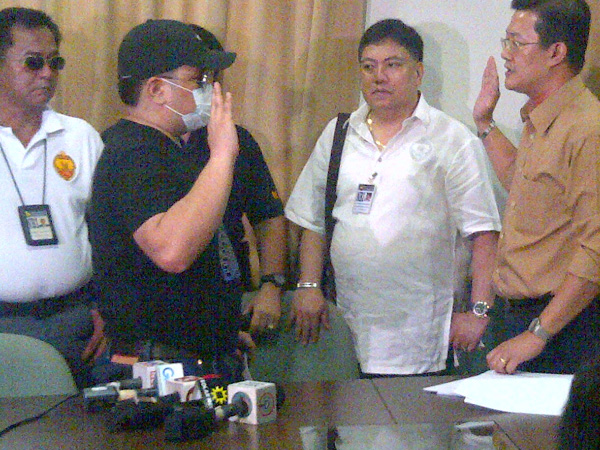Rasuman scam suspect cleared for lack of evidence

Jachob “Coco” Rasuman shows up at the Department of Justice and swears in on his counter-affidavit denying allegation that he defrauded investors in a Ponzi scheme. TETCH TORRES/INQUIRER.net FILE PHOTO
SAYING the government’s case was weak, the Court of Appeals has affirmed the decision of the Pasig City Regional Trial Court clearing one of the accused in the multimillion-peso Rasuman investment scam that victimized many people in Mindanao and other provinces.
In a 16-page decision dated March 30, the appellate court’s Second Division said prosecutors failed to show clear and convincing proof that accused Sultan Yahya “Jerry” Tomawis played a vital role in the investment scheme allegedly hatched by his son-in-law, Jahcob “Coco” Rasuman, and 13 other relatives.
The Department of Justice filed the syndicated estafa case based on the complaint of scam victim Hassan Pangandigan, a businessman who invested P11.2 million and his 2007 Honda Civic in Rasuman’s company, NAD 21 Auto Option, for a P12.7-million return of investment.
Tomawis, administrator and chief executive officer of the Southern Philippines Development Authority, a Davao City-based government-owned investment corporation, was earlier cleared of the charges filed by other victims of the investment scam in Cagayan de Oro City.
He denied involvement in the scam, saying he was being linked to it by the victims because he was the father of Rasuman’s wife, Princess Aliyah Jenna.
Article continues after this advertisementIn its decision, the Court of Appeals said it “discern[s] no error” on the part of the RTC when it recalled the warrant and dismissed the case against Tomawis for lack of probable cause after he was able to show that he was not involved in the conspiracy to defraud the victims.
Article continues after this advertisementNothing on record
“Apparently, all the statements of [Pangandigan] in his complaint-affidavit point to the fact that the investment transactions were only between him and [Tomawis’] coaccused. There is nothing on record which would show that [Tomawis] had any participation in the scheme,” the court said in the decision written by Justice Priscilla Baltazar-Padilla.
“All the acts of inducement, false pretenses and fraudulent representations to induce [Pangandigan] to part with his money and vehicle from the very beginning were done by [Tomawis’] coaccused. It was also his coaccused who received the money from [Pangandigan] and failed to return the same,” the court said.
The other division members, Justices Remedios Salazar-Fernando and Socorro Inting, concurred in the ruling.
In November 2013, a special panel of prosecutors from the DOJ found probable cause to file the syndicated estafa case against Tomawis. The Pasig RTC issued a warrant of arrest against the accused the following month.
Tomawis, however, filed a motion for reconsideration, which the court granted in June 2014. The DOJ elevated the matter to the Court of Appeals.
The court did not give credence to Pangandigan’s contention that Tomawis was involved in the scam since he was present at Rasuman’s birthday celebration in June 2012 and even assured investors there that Rasuman’s business was legitimate; Tomawis owned the building in Marawi City where Rasuman held office, and because Tomawis signed bankruptcy papers filed by NAD 21 Auto Option.
“[C]onspiracy cannot simply be presumed from these allegations. The acts alluded to [Tomawis] do not suffice to engender a well-grounded belief that he conspired with his coaccused in defrauding private complainant, in particular, and the public, in general. Well-settled is the rule that conspiracy must be shown to exist clearly and convincingly as the commission of the offense itself,” the court ruled.